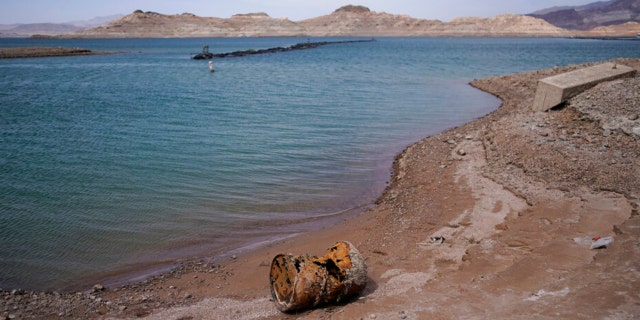NEWYou can now listen to Fox News articles!
Human remains surfacing in Lake Mead have sparked a renewed interest in Las Vegas mob history.
The Nevada city’s former mayor, Oscar Goodman, told The Associated Press on Monday that the reservoir is “not a bad place to dump a body.”
LAKE MEAD DROUGHT EXPOSES MORE HUMAN REMAINS
“There’s no telling what we’ll find in Lake Mead,” he said.
Drought threatening the western U.S., spurred by human-caused climate change, has led to the discovery of human remains.
One victim, who police said is believed to have been shot decades ago, was found in a barrel last week.
A formally sunken boat sits on cracked earth hundreds of feet from what is now the shoreline on Lake Mead at the Lake Mead National Recreation Area, Monday, May 9, 2022, near Boulder City, Nev.
(AP Photo/John Locher)
A few days later, a second, empty barrel was found by a KLAS-TV news crew.
On Saturday, National Park Service (NPS) rangers received a witness report of human skeletal remains discovered at Callville Bay. Las Vegas police said Monday that there was no immediate evidence of foul play and that they are not investigating.
Lake Mead has dropped more than 170 feet since 1983, and the uppermost water intake became visible last week.
LAKE MEAD’S BODY IN BARREL IS VICTIM WHO WAS LIKELY SHOT DECADES AGO, LAS VEGAS POLICE SAY
Persistent drought is predicted to expand this year, amid warmer temperatures.
Goodman – who was previously a lawyer, representing mob figures including the ill-fated Anthony “Tony the Ant” Spilotro – declined to name names about who might turn up next.

Rusting debris that used to be underwater sits above the water level on Lake Mead at the Lake Mead National Recreation Area, Monday, May 9, 2022, near Boulder City, Nev.
(AP Photo/John Locher)
“I’m relatively sure it was not Jimmy Hoffa,” he joked, but noted that a lot of his former clients seemed interested in “climate control.”
Geoff Schumacher, vice president of The Mob Museum, said that the barrel was a “signature of a mob hit.”
David Kohlmeier, a former police officer who now co-hosts a Las Vegas podcast and TV show called “The Problem Solver Show,” said Monday that, after offering a $5,000 reward last week for qualified divers to find barrels in the lake, people contacted him who were willing to do so.
CLICK HERE TO GET THE FOX NEWS APP
The NPS said that’s not allowed and that there are hundreds of barrels in Lake Mead’s depths.
Fox News’ Louis Casiano, Bradford Betz and The Associated Press contributed to this report.